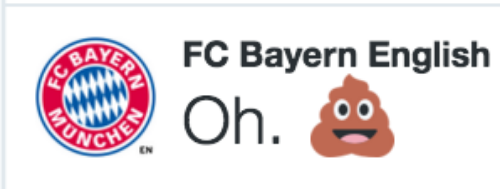The authentic > the aesthetic
The tweet was wrong. All wrong.
Garbled, poorly punctuated words IN ALL CAPITALS. No context of the game, no emojis, no achingly cool graphic within brand guidelines and, even as they admitted themselves, it was late.
And yet it conveyed the most important quality in sports social media – authenticity.
Middlesbrough had scored in the fourth minute of injury time to beat Reading and haul themselves back to the top of the Championship. With just a handful of games to go, the prize of the Premier League was in sight. But there were only two promotion places available and three clubs in the race. Home wins were crucial. So when Adam Forshaw scored, the Riverside Stadium erupted but @Boro, the club’s social media account was quiet for a few minutes.
Then this happened…
There is cold, hard cash in sports social media these days and, inevitably, management has followed. Slick messaging is supposedly an art form worth paying for if you are the type of person too busy or important to write your own posts.
This was nothing like Middlesbrough ‘should’ have done but it was still perfect. They were fans talking to fans in the best kind of way; a kinship that transcends class, race or religion… along with social media best practice and, it seems, the laws of diction.
Something similar could be said of Borussia Dortmund’s tweet after their dramatic defeat in the Europa League Quarter-Final at Anfield. The ‘authenticity’ we seek is closely linked to a kinship with your fanbase. And this means the silent majority of ‘lurkers’ on social media, not just the ‘squeaky wheels’ who vocalize.
It is probable that the Yellow Wall said exactly the same thing at exactly the same time. Or perhaps something a bit more industrial, but in a similar vein.
Bayern’s English account nailed that with an emoji when they conceded an early goal against Benfica the night before.
It is a brave club account that does this. But it is entertaining and, most importantly, taps into the thoughts of your fanbase.
But if you want to see the potential of the truly authentic then consider this. Kobe Bryant’s “Dear Basketball” tweet was the most retweeted athlete post of 2015. Between November 29 and now it has amassed over 130,000 retweets.
It was sincere, considered, refined, professional and, one would think, highly managed.
In April, Conor McGregor’s supposed ‘retirement’ tweet beat that mark inside two days. The Irishman is arguably the biggest star in UFC, a sport that has barged its way into the bright lights of the mainstream over the past 18 months, and his ‘news’ was an utter surprise. Yet you know it came from the man himself.
The language, the brashness, the tone, the straight-talking lack of pretension of the tweet screamed authenticity. You could imagine a snarling McGregor furiously tapping it out as he stood in the locker room drenched in sweat.
Now Bryant has an image to manage, a legacy to protect and a post-basketball career to plan. He is not measuring the success of his exit strategy in retweets. McGregor, meanwhile, has backtracked somewhat from his earlier retirement suggestions. Both wanted their message out their in different ways and they achieved their objectives.
But the lessons are there for those of us who manage sporting social media accounts – players, clubs or governing bodies.
Polished is professional and finesse is fine but realism, believability and passion are everything.
The trick is to combine both halves of the equation.
But, as the fat-fingered @Boro account proved that barmy night, if you are going to err on one side or the other then go for authenticity.







